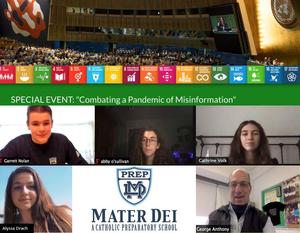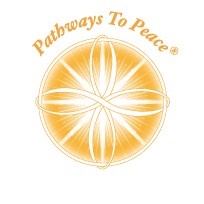Mater Dei Prep Global Institute Students Attend “A Pandemic of Misinformation” Virtual Conference
 Mater Dei Prep students Abby O’Sullivan (MDP ’24), Garret Nolan (MDP ’24), Catherine Volk (MDP ’24), and Alyssa Drach (MDP ’24) attended an International Conference as student representatives of The MDP Global Institute and UN NGO Pathways To Peace on addressing “A Pandemic of Misinformation”, combatting variations of COVID-19 dangers and responses. Students from MDP participated virtually with an international panel of experts.
Mater Dei Prep students Abby O’Sullivan (MDP ’24), Garret Nolan (MDP ’24), Catherine Volk (MDP ’24), and Alyssa Drach (MDP ’24) attended an International Conference as student representatives of The MDP Global Institute and UN NGO Pathways To Peace on addressing “A Pandemic of Misinformation”, combatting variations of COVID-19 dangers and responses. Students from MDP participated virtually with an international panel of experts.
In this age of COVID-19, the rapid spread of misinformation may be as dangerous as the virus itself. International experts examined and shared with students why people believe and spread misinformation. They offered techniques and resources to help students (and educators) recognize “red flags” of misinformation (“fake news”). A Student Panel at the conference directed special attention to social media. Participants heard from UN communications professionals about special initiatives underway to stem the spread of misinformation and were informed on how educators and students can participate in this effort.
Speakers included:
- Maher Nasser, Director of the Outreach Division, United Nations Department of Global Communications
- Ramu Damodaran, Chief, United Nations Academic Impact
- Irwin Arieff, Journalist and Editor, Reuters (ret.); contributor to PassBlue
- Yoo Kyung Chang, Teachers College, Columbia University and Youth Panelists
Some of the topics discussed were:
- Click-Bait: Internet content, whose main purpose is to attract attention and encourage visitors to click on a link to a particular web page.
- Disinformation: Deliberate distortion of information intended to deceive public opinion.
- Fake News: What was once called ‘yellow journalism’ – news stories that have no factual basis, but are presented as fact; propaganda or hoaxes spread via traditional news media or social media. It can also be used to discredit anything that seems hostile to someone’s specific agenda.
- Misinformation: Incorrect information of any kind, whatever the intention or source.
- Synthetic Media: The attempt to create a fake news site that closely and deceptively resembles a real or well-known one
Mater Dei Prep students shared their views:
Garrett Nolan, “I had the opportunity to attend a webinar hosted by the United Nations about “digital literacy” and fact-checking what you read and post on the internet. It is important to make sure something is true before you post it. Not only is the internet ‘eternal’, but anyone around the globe could see it. When you post something that is a lie, many people will still believe it. The past year has, at the very least, been trying for this country and the world. We have seen a frightening amount of biased news sources ‘spinning’ the truth to suit their target audience or sponsors. One must make sure that something is true and factual before posting it for the world to see on the internet.”
Abigail O’Sullivan, “The webinar on misinformation during the COVID-19 outbreak was extremely useful in helping me learn how to stop the spread of wrong information. One individual talked about the 5 C’s: Critical thinking, contexts, credibility, construction, contribution, and comparison. They explained this concept of the 5 C’s is to inform us to watch what we repost and how we interpret information.”
Catherine Volk, “I thought presentation was very interesting and informative. The Verified program initiated by The United Nations to “fact check” information and web sites (sites and not ‘bots’) was very interesting. I am excited to see what happens with the 2021 year of recovery, and I believe the different programs will help many people. I also am hopeful that more programs to help teachers and students combat misinformation are made available to more schools. Overall, I enjoyed to presentation and thought it was quite useful.”
Alyssa Drach, “This meeting gave me some more knowledge about how everyone else is reacting to the pandemic. The International Panel of Speakers that I found to be the most interesting were the students. I can relate to them since I am a student as well. It reminded me how important it is to follow the science and the guidelines. We will not be able to fight COVID-19 if we don’t work together.”
George Anthony, Director of The MDP Global Institute, welcomed the student participation. “I think it is vital that students utilize critical thinking skills and acknowledge the various forms of media manipulation that seeks to confuse, divide and misinform societies in an effort to create cultural and systemic divisions. Knowledge, information and science will assist towards the working together, where we all can benefit in finding solutions towards safer and informed societies. Our students will take the ‘tools’ they gather from these conferences and classroom lessons and apply them toward their own communities locally and globally. They are, in my mind, tomorrow’s leaders, emerging!”
